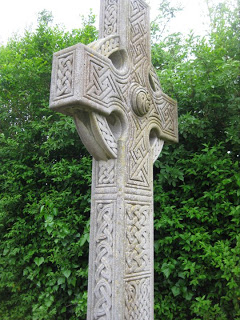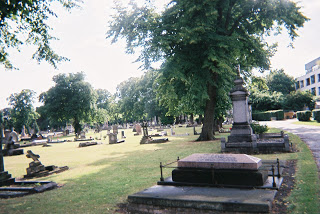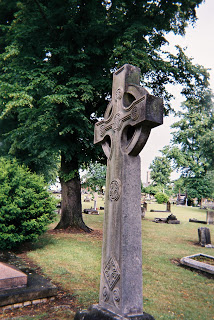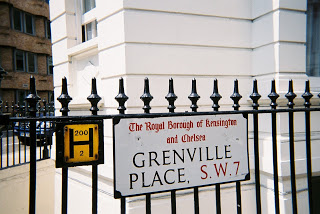Medieval History
Dr Elizabeth Boyle writes:
Following my adventure in search of the memorial cross erected at St Fintan's church, Sutton, Co. Dublin, to the Celtic scholar, Whitley Stokes (1830-1909), I decided to find the place where he is actually buried, in Paddington Old Cemetery, London. I was particularly interested to see whether his gravestone was similar in style, or whether it bore a similar inscription, to the cross at St Fintan's.



- Recent Asnc News ...
Congratulations to Dr Levi Roach and Dr Helen Foxhall Forbes (both of whom studied ASNC at undergraduate and postgraduate level), who have both been appointed to lectureships in Medieval History at the University of Exeter. Indeed, further congratulations...
- New Book!
Elizabeth Boyle and Paul Russell, both of the Department of ASNC, have recently published a volume of essays on the life and scholarship of the Celtic scholar and colonial jurist, Whitley Stokes (1830-1909). The volume arises from the conference which...
- From Ireland To India
ELB writes: Last September, ASNC hosted a conference to commemorate the centenary of the death of Whitley Stokes (1803-1909), the Celtic scholar and colonial jurist. Today, one of the contributors to that conference, Prof. Dáibhí Ó Cróinín, has a...
- Greed Wasn?t Good In The Middle Ages ? Historian Looks At Medieval Business Ethics
ith business and financial scandals common in today?s new headlines, the axiom ?Greed is good? often seems to be the working philosophy of many wealthy executives and businessmen. But greed hasn?t always been popular in Western societies. Stanford...
- Medieval And Modern Manuscript Studies In The Digital Age (mmsda) 28 April ? 2 May 2014, Cambridge And London
With apologies for cross-posting, we are very pleased to announce the fifth year of this course, funded by the Digital Scholarly Editions Initial Training Network (DiXiT), and run by DiXiT with the Institute of English Studies (London), the University...
Medieval History
Adventures in a graveyard, Part 2
Dr Elizabeth Boyle writes:
Following my adventure in search of the memorial cross erected at St Fintan's church, Sutton, Co. Dublin, to the Celtic scholar, Whitley Stokes (1830-1909), I decided to find the place where he is actually buried, in Paddington Old Cemetery, London. I was particularly interested to see whether his gravestone was similar in style, or whether it bore a similar inscription, to the cross at St Fintan's.

Stokes' memorial cross at St Fintan's, Sutton, Co. Dublin
Paddington Old Cemetery is located in the diverse district of Kilburn, north of Kensington (where Stokes lived after returning from India in 1882 until his death in 1909).
Paddington Old Cemetery, London
I found Stokes' grave in somewhat better condition than some of the others in its vicinity. The cross was indeed in the Celtic Revival style, although notably less ornate than the memorial cross at Sutton.
grave of Whitley Stokes (1830-1909), Paddington Old Cemetery
The inscription was also quite different from that at St Fintan's. First, there was no indication of Stokes' profession or scholarly interests.Where the St Fintan's cross had described him as 'Jurist, Scholar and Philologist', his London gravestone gave only the spare details of his name and dates, reflecting perhaps the more private, family-oriented nature of the memorial, as opposed to the more public, or scholarly, nature of the Sutton cross. The quotation chosen for the inscription was also quite different in tone. Where the St Fintan's cross stated:



DIE WAHRHEIT RUHT IN GOTT
UNS BLEIBT DAS FORSCHEN
('Truth lies with God; for us remains Research')
the Paddington memorial gave a biblical quotation, from Philippians 4:8:
WHATSOEVER THINGS ARE TRUE. WHATSOEVER THINGS
ARE HONEST. WHATSOEVER THINGS ARE JUST.
WHATSOEVER THINGS ARE PURE. WHATSOEVER THINGS
ARE LOVELY. WHATSOEVER THINGS ARE OF GOOD
REPORT. IF THERE BE ANY VIRTUE, AND IF THERE BE
ANY PRAISE, THINK ON THESE THINGS.
Stokes grave inscription
The overall effect was simple, but quite moving, and in striking contrast to the form and content of the St Fintan's memorial. But having found Stokes' grave I decided that the next challenge would be to find his house. So I left Kilburn, and set off towards one of London's most affluent districts:
Grenville Place, Kensington
Perhaps rather fittingly, Stokes' home at 15 Grenville Place technically no longer exists, since 14 and 15 Grenville Place have been knocked together and turned into separate flats. However, the house still retains the impressive frontage, including the front door (no longer in use), which it would have had in Stokes' day.
15 Grenville Place, Kensington, formerly the home of Whitley Stokes (1830-1909)
In Stokes' time, as now, this was a prosperous part of London, and emphasises the wealth which Stokes accumulated during his time as a colonial jurist in British India, where he became President of the India Law Commission. A stark contrast indeed to the penniless young barrister who had to sell his furniture in order to buy his passage to India in 1862, and a reminder of the more problematic moral complexities of the life of Ireland's greatest Celtic scholar.
- Recent Asnc News ...
Congratulations to Dr Levi Roach and Dr Helen Foxhall Forbes (both of whom studied ASNC at undergraduate and postgraduate level), who have both been appointed to lectureships in Medieval History at the University of Exeter. Indeed, further congratulations...
- New Book!
Elizabeth Boyle and Paul Russell, both of the Department of ASNC, have recently published a volume of essays on the life and scholarship of the Celtic scholar and colonial jurist, Whitley Stokes (1830-1909). The volume arises from the conference which...
- From Ireland To India
ELB writes: Last September, ASNC hosted a conference to commemorate the centenary of the death of Whitley Stokes (1803-1909), the Celtic scholar and colonial jurist. Today, one of the contributors to that conference, Prof. Dáibhí Ó Cróinín, has a...
- Greed Wasn?t Good In The Middle Ages ? Historian Looks At Medieval Business Ethics
ith business and financial scandals common in today?s new headlines, the axiom ?Greed is good? often seems to be the working philosophy of many wealthy executives and businessmen. But greed hasn?t always been popular in Western societies. Stanford...
- Medieval And Modern Manuscript Studies In The Digital Age (mmsda) 28 April ? 2 May 2014, Cambridge And London
With apologies for cross-posting, we are very pleased to announce the fifth year of this course, funded by the Digital Scholarly Editions Initial Training Network (DiXiT), and run by DiXiT with the Institute of English Studies (London), the University...
